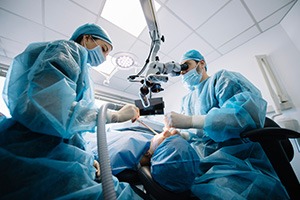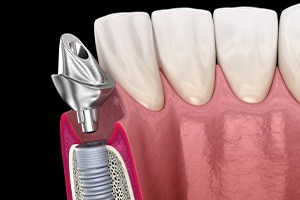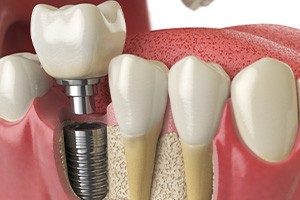Dental Implants Matthews
A Forward-Thinking Approach to Tooth Replacement

Choosing a restorative solution for missing teeth that is only temporary and needs to be replaced every few years may not be what you have in mind. If longer-lasting prosthetics that look natural, feel comfortable, and can remain firmly in place for 30+ years are what you prefer, you cannot go wrong with dental implants in Matthews. As a more forward-thinking approach to tooth replacement, Dr. More offers free implant consultations as well as placement and restoration in-house, so you don’t need to worry about going elsewhere for this type of treatment. Call our office to let us know if you are interested in scheduling a consultation with our dental team today.
Why Choose More Dentistry for Dental Implants?
- Free Dental Implant Consultation
- Start-to-Finish Dental Implants In-House
- Diverse Staff That Speaks Spanish & English
What are Dental Implants?

When losing one or more teeth as a result of infection, damage, or extraction, dental implants can serve as replacement prosthetics that help rebuild your smile. While the posts mimic tooth roots and integrate with bone tissues through osseointegration, the customized restoration rests on top to create a full set of teeth. Their foundational support allows these titanium posts to hold up crowns, bridges, or dentures based on the needs of the patient, and they can last decades or even a lifetime.
The 4-Step Dental Implant Process

Getting dental implants can take months, as they have a more complex treatment process than dentures or dental bridges. Still, you can rest easy – the benefits of these posts are worth the time and effort! Our practice handles the entire placement in-house, ensuring each patient gets the best possible results. We’ll even share the details on how dental implants work in Matthews. So, keep reading to learn the four treatment phases: consultation, surgery, osseointegration, and final restoration.
Initial Dental Implant Consultation

First and foremost, you’ll meet Dr. More for a brief consultation. Doing so lets him learn your treatment goals, as well as your oral health background and other vital factors. We’ll use such feedback to confirm whether dental implants suit you and adjust your treatment plan.
Should we decide you don’t qualify for dental implants, please don’t panic. You can become a good candidate later through extra dental work – gum disease treatment, tooth extractions, etc. Such services would strengthen your mouth to handle implant posts.
Dental Implant Surgery

Rather than send you away, we’ll perform your dental implant surgery in-house. This approach ensures you benefit from Dr. More’s advanced expertise and skill set. Plus, it’ll save time otherwise spent traveling to see some other oral surgeon.
Any given dental implant surgery has a few crucial steps. For starters, Dr. More will numb the treatment site so it doesn’t ache while he works. He’ll then make a small incision in your gums to create room for the implant post. With the incision made, he and his team can precisely place the implant before suturing your gums shut. The surgery will end with Dr. More putting a protective cap over the post.
Dental Implant Osseointegration & Abutment

Soon after your surgery, your dental implant will start fusing with your jaw. This process is called osseointegration and takes roughly 4-6 months to finish. Once it’s done, your new “tooth” will be secured to your jaw and become a permanent part of your mouth.
You’ll have a follow-up surgery once you’ve healed from the fusion. At that session, we’ll place an abutment – a metal connector – on your implant that secures the restoration. A lab will craft the final prosthetic while you recover.
Delivery of Dental Implant Restoration(s)

At the end of your implant treatment, Dr. More will deliver your final restoration. That means he’ll place a dental prosthetic consistent with how many teeth you lost. Based on the exact number, the final device could be a dental crown, dental bridge, or an implant denture.
It won’t take long for us to fit your final restoration; we’ll just apply some dental cement. During this fitting, our team will also make last-minute changes to ensure quality results. That’ll ensure you end treatment with a beautifully restored smile you can enjoy!
Benefits of Dental Implants

Over the years, dental implants have become increasingly popular, making them a preferred choice for many who once experienced life with missing teeth. Should you choose to join the millions of individuals who are enjoying the many benefits of dental implants, you can expect:
- A smile that lasts 30+ years as long as you commit to taking proper care of your oral health and hygiene.
- A more natural-looking appearance that helps to reverse the aging process.
- Superior confidence in your ability to speak, smile, and eat.
- Fewer food restrictions, as your dental implants will act similarly to natural teeth.
- Teeth that are easy to maintain using a soft-bristled toothbrush, nonabrasive toothpaste, and dental floss.
- Supple facial skin, as your dental implants will continue to stimulate the jawbone and prevent sagging.
Dental Implant FAQs
Does dental implant surgery hurt?
Most patients describe feeling a little pressure during dental implant surgery, but nothing that resembles pain. This is due to a few reasons. Firstly, Dr. More puts a lot of effort into treatment planning so he can be as conservative as possible during the procedure. This leads to less trauma to the soft and hard tissues during placement, resulting in minimal post-treatment swelling and soreness.
Also, the jawbone doesn’t contain that many nerve endings, meaning it can’t feel much of anything, pain or otherwise. And lastly, the area is numbed beforehand, and patients can opt for sedation if they need more help staying comfortable in the chair.
Will I need to take time off for dental implant surgery?
We recommend that every patient at least take the day of their procedure off to relax, which will give their mouth a great start to the healing process.
If your job consists of a lot of moving around and physical activity, you should plan on taking about three to four days off. Too much effort too soon after dental implant surgery can increase bleeding and swelling during recovery as well as interfere with the posts’ ability to meld with the surrounding bone, which is essential to long-term success.
However, if you mostly work at a computer, you can likely resume your normal routine the next day.
Are there any diet restrictions with dental implants?
During the first week or so after implant placement surgery, a patient is recommended to follow a soft food diet, as too much chewing can end up placing excessive pressure on the sensitive treatment area or cause it to become contaminated with food particles. It’s wise to stock up on items like soup, yogurt, eggs, and shakes ahead of the procedure.
But, once the implants are set and the new teeth are attached, patients can eat whatever they like. We only ask them to be mindful when biting into particular hard or tough foods, but this is something we say to everyone, regardless of whether they have dental implants!
Can I take dental implants out?
No, you will not be able to take your dental implants out once they have been placed. They are designed to work like your natural tooth roots, meaning they are affixed within the jawbone. This offers a few advantages in that you can clean them just like your regular teeth with routine brushing and flossing. Plus, this stability is what makes them extremely strong, giving you a bite force that is comparable to natural teeth.
